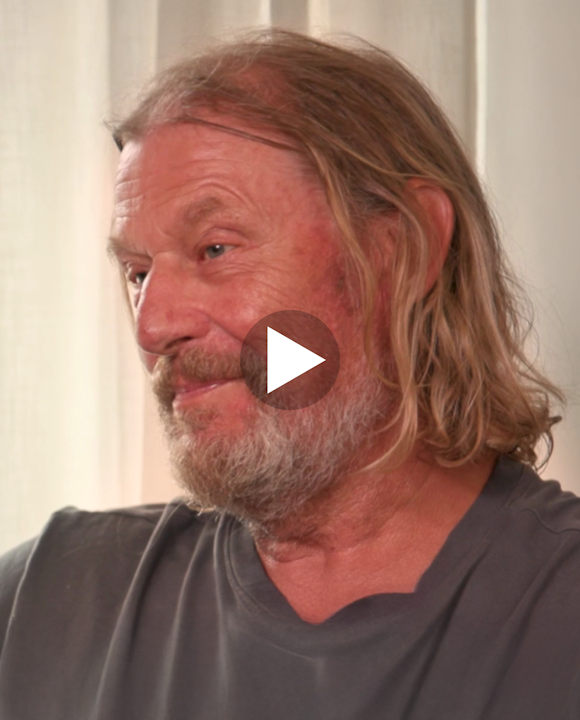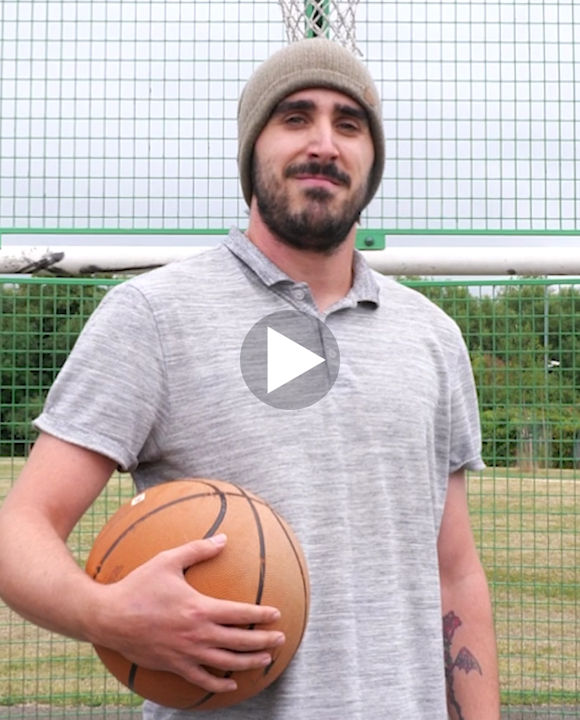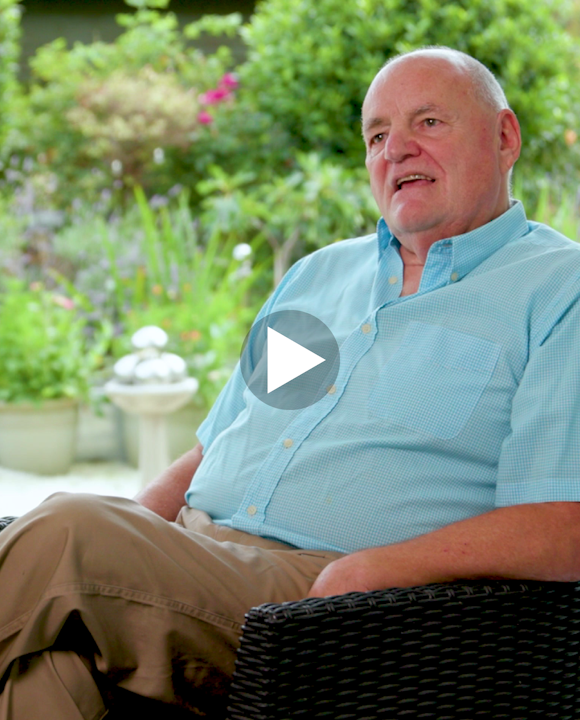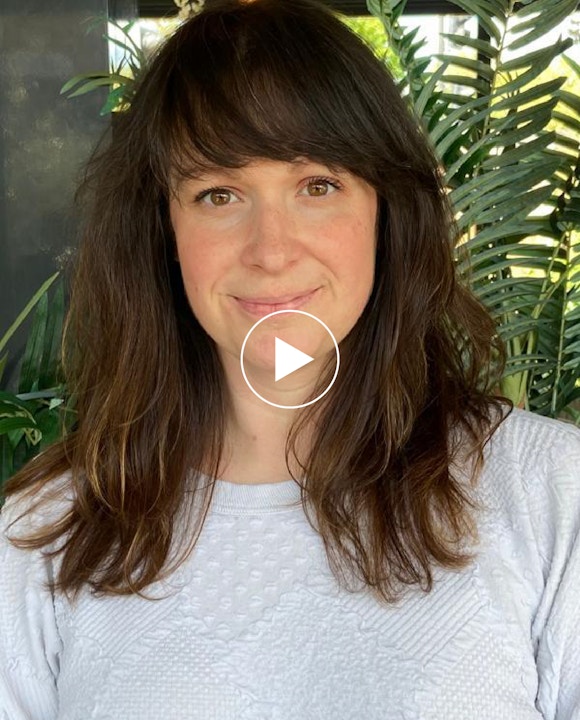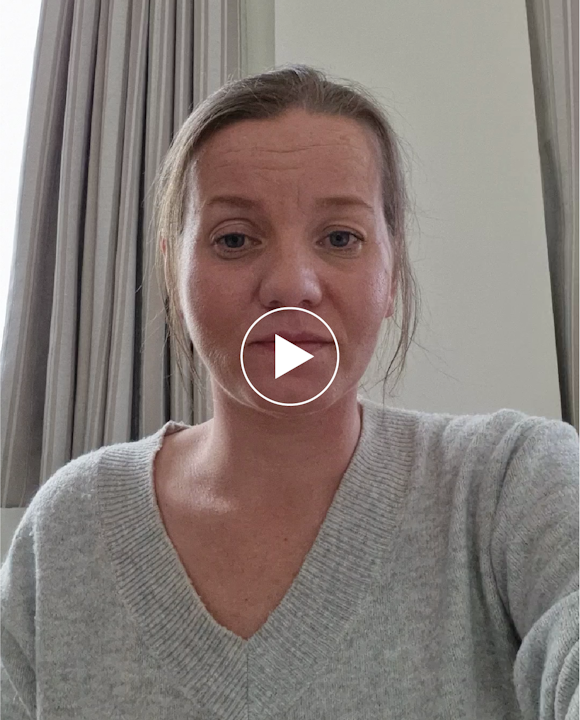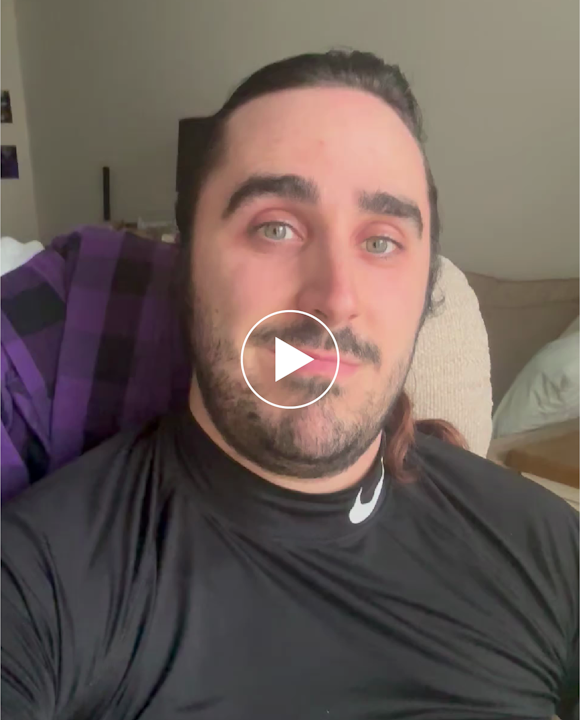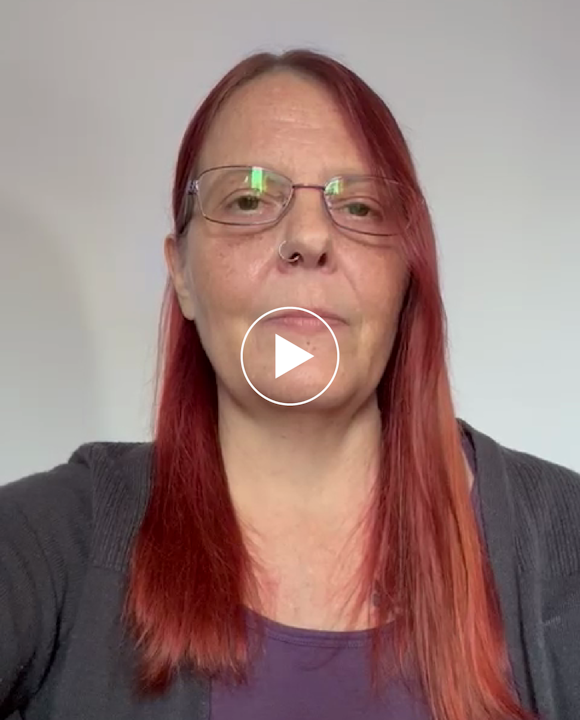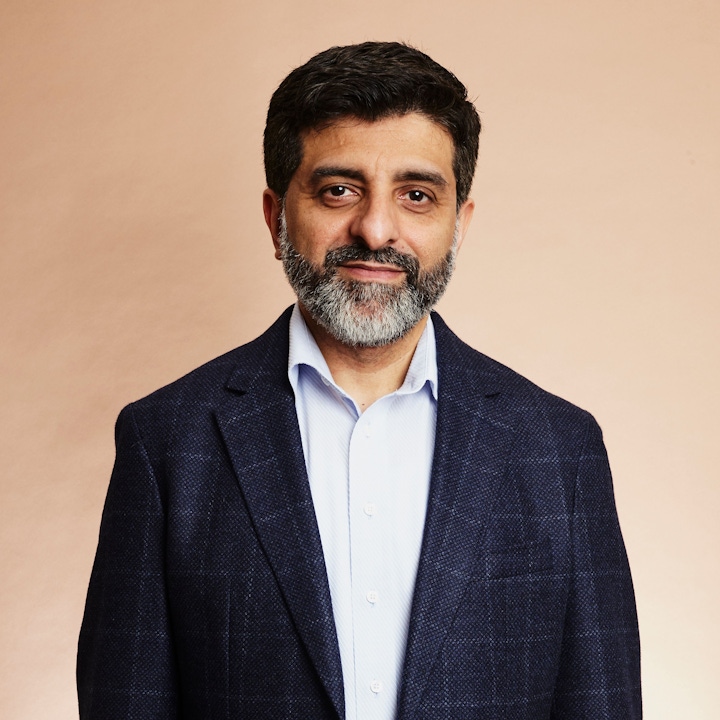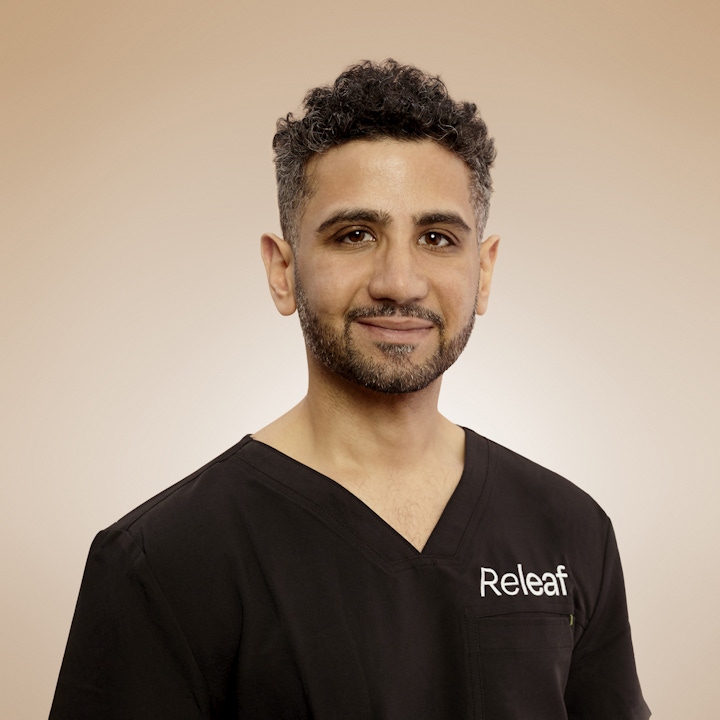Start 2026 by putting your health first
For a limited time only, get £50 off your first consultation with code HEALTH50. A smart way to start the new year.
When traditional medications are not enough.
Is chronic pain, mental health or a sleep disorder effecting your wellbeing?
46% of UK adults
live in significant discomfort with a condition potentially treatable with medical cannabis.
Get a treatment plan for:
Whatever your condition, get expert help to reach your goal. Access a wide range of high quality, carefully selected cannabis products.
“The service that Releaf provides can make a huge difference to a wide range of debilitating conditions – and it IS legal in the UK. I’ve seen first hand what this approach can do for people with various illnesses and the benefits were life changing”
Linda Robson
TV Personality and medical cannabis advocate
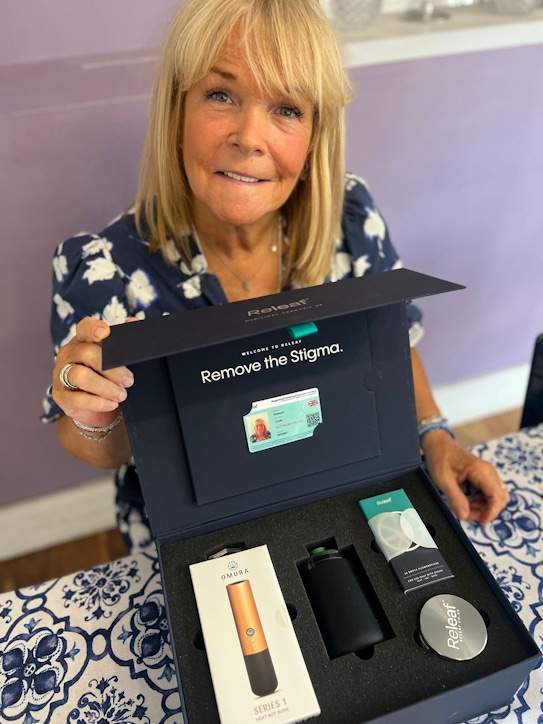
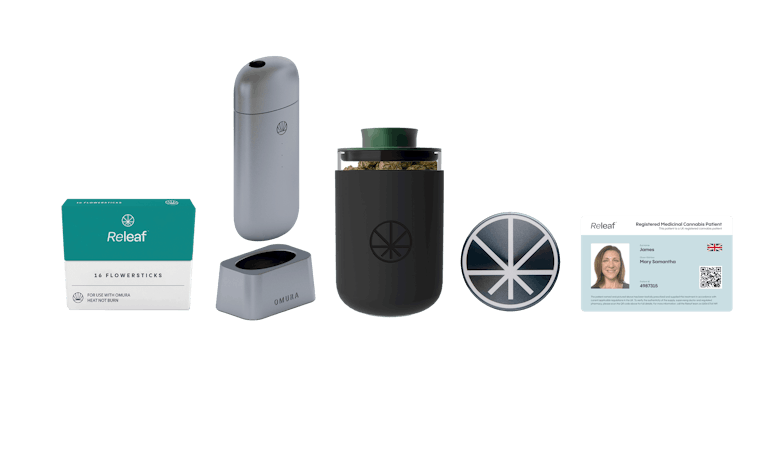
Get access to medical cannabis
Access a full range of cannabis products and treatments
Including THC cannabis oil and THC cannabis flower treatments.
Select your treatment from the patient portal
After you have received your medical cannabis prescription.
Start your road to recovery
Or experience exceptional palliative support with your condition.
Get on hand help and guidance
New to cannabis? No problem. We’re here to hold your hand at every stage.
Join our growing community of over 150,000 people
Whether you’re new to cannabis-based medicines, switching from another medical cannabis clinic, or self-medicating, we’ll put you back in control of your health.
How to get Releaf
You’re just 3 steps away from accessing the right cannabis treatments for your condition.
9 out of 10
Who attend a consultation can access medical cannabis with Releaf.
- Step 1
Book your online consultation now
Our specialists will review your medical records and confirm if you are one of the 98% of people who can access medical cannabis.
- Step 2
Create a treatment plan with your doctor
Your 30 minute consultation costs £99. This ensures you get the best quality of care and due diligence. This is fully refundable if you are not eligible for our treatment plans.
- Step 3
Access your medical cannabis
Your medical cannabis prescription will be safely delivered to your door within 5 working days.
Reasons why people use and love Releaf


Money back guarantee
If our specialists do not approve you for medical cannabis we’ll refund you the full cost of the initial consultation.

Easy and flexible payments
Pay-as-you-go for treatment and consults, or join the Releaf+ subscription for cost predictability with a low monthly fee.
Peace of mind
With our unique medical cannabis card that is developed with police support, you don’t need to worry about using your cannabis.
FAQs
Stop the cannabis stigma with these useful FAQs. Have a question, reach out to us.Yes, patients legally prescribed medical cannabis in the UK can drive, provided that they:
- Are not impaired in any way
- Can prove that the cannabis medication has been legally prescribed
- Are taking their prescribed cannabis medication as directed by your specialist consultant
The Cannabis Industry Council (CIC) states that as long as the above criteria are met, legally prescribed medical cannabis patients have a legal defence, even if they have over 2μg/L of THC in their blood and are subsequently arrested/charged.
That said, it is the patient’s responsibility to judge whether they are fit to drive before getting behind the wheel.
If you like to learn more, head to our medical cannabis and driving guide.
Our experts
Step 1 — Book consultation
Book your consultation
Book your consultation appointment with our specialists today. If our doctors are unable to prescribe you medical cannabis we will refund 100% of your initial consultation costs. 9 out of 10 patients can receive medical cannabis.
Book your consultationConsultation fee
£99.99

Step 2 — Choose payment
£39.99 pm
Included with Releaf+:
FREE follow up consultations
FREE prescription charges
FREE delivery
Unlimited access to patient support
Reduced medication prices
Priority consultations
Access to Releaf+ rewards programme with exclusive discounts on global brands
Physical Medical Cannabis Card
Get medical cannabis from £7.99 per gram
Get 30ml of medical cannabis oil for £134.99
SAVE £87 per month on average with Releaf+*
* Releaf+ users could save £87pm over a 12 month treatment plan based on a monthly prescription of 30g of cannabis flower. Minimum order quantity of 10g.
Exploring the UK's Medical Cannabis Laws: What You Need to Know
In 2025, the United Kingdom is seen as a diverse and progressive society with a multicultural populous. Its world-class healthcare innovations navigate a complex system of regulatory laws and frameworks. Recently, new medicinal cannabis laws have enabled businesses to contribute to the progressive industry devising new strategies to deliver medicinal cannabis prescription medication to patients. The landscape can be confusing to understand, with many regulations that must be met and challenges overcome. So let’s go on a journey to enlighten the pathway through the cannabis regulatory process in the UK.
Medical cannabis products, unlike recreational cannabis, are legal in the UK. Medical cannabis has to be prescribed by a registered specialist doctor on the General Medical Council for specific conditions such as chronic pain, Dravet syndrome, Lennox-Gastaut syndrome, multiple sclerosis, and nausea [1] developed as a result of chemotherapy treatment. Private practices can prescribe medical cannabis for a wider range of medical needs, but this is unavailable on the NHS. In the UK, marijuana remains illegal to buy or grow without a prescription and is classified as a Class B drug, which can result in up to 5 years in prison if found in possession without a prescription for a cannabis based product. The process for obtaining a UK medical cannabis prescription through the NHS can be challenging, and currently access to legal medical cannabis remains limited in the United Kingdom.
Current Medical Cannabis Laws in the UK
Medical cannabis laws in the UK have a long and complicated history. For the last decade anyone has been able to buy CBD oil from health food shops and even supermarkets. As of now, it is legal to use medical cannabis (UK) if you obtain a prescription from a registered private doctor through a medicinal cannabis clinic. However, people found illegally growing cannabis risk between five and fourteen years in prison, even if they have a medical condition.
The NHS currently only recognises four medical conditions eligible for prescriptions: Dravet syndrome, Lennox-Gastaut syndrome, Multiple sclerosis, and Nausea developed as a result of chemotherapy treatment. Only 977 NHS prescriptions for Cannabis Based Medicinal Products (CBPMs) were issued in 2021 according to the Cannabis Industry Council [2]. However, private practices have more freedom when prescribing medical cannabis and can prescribe it for a wider range of medical needs.
The UK medical cannabis registry provides legal access in the UK, but progress around changes in law and guidelines has been slow. Conferences such as Cannabis Europa by Prohibition Partners and research from Drug Science aim to draw more attention to the issue. Many people who could benefit from medical cannabis struggle to access it due to the limited availability of prescriptions. The limited availability for prescriptions is increasing the end cost to the patient. Attitudes towards cannabis use are slowly changing; however, patients need adequate access to medical marijuana.
In order to obtain medical cannabis, you must be eligible for a prescription. This process involves an initial assessment by a registered specialist doctor, followed by an application made through the government’s Home Office. Licences are only granted when medicinal cannabis has been accepted by healthcare and social care professionals as an appropriate treatment option.
According to research conducted by Public Health England, approximately 7.4% of UK citizens have used cannabis [3] within the past year, despite its illegal status for recreational use. This highlights how easy it is for people who do not have access to medical care to fall into criminality and risk imprisonment simply for accessing this substance.
Although there are risks associated with the use of medical marijuana products as with any medication, patients must weigh up their benefits versus their risks when deciding on whether or not they should pursue prescription treatment involving medicinal cannabinoid products. Those risk factors and potential side effects include things such as memory impairment, dizziness, decreased reaction times and possible addiction. It is important to note, however, these side effects are often less severe than traditional treatment options and are usually minimised by using low THC strains. Research by Drug Science in their Project Twenty21 [4] study has indicated that patients prescribed CBMP’s experience few negative symptoms after administering a dose.
Medical marijuana should be looked at in the same way any other prescription medication is considered regarding the risks and benefits of its use. For example: chemotherapy for cancer can damage healthy cells and has many unpleasant side-effects, but when weighed against the potential life-saving benefits, it becomes a logical course of treatment.
Now that you understand more about medical cannabis UK laws, let’s take a closer look at recent changes to the law and how they affect those who are seeking to access medical cannabis products legally.
Recent Changes to the Law
Medical use of cannabis was legalised in November 2018 within the UK [5], and under current laws, it can only be prescribed by a registered specialist doctor because it is a controlled drug. The change became public following high-profile cases involving two boys with epilepsy whose parents lobbied extensively for medicinal cannabis legalisation - a far cry from an over the counter CBD product.
In 2018, Alfie Dingley, a young boy suffering from a rare and debilitating form of epilepsy, became the first child in the UK to receive a prescription for medical cannabis. His case helped change the narrative around medicinal cannabis use and forced the government to take action surrounding its regulation and availability.
The new law also allowed for cannabis-based products such as Sativex to become eligible for medicinal use through private practices or obtaining an NHS prescription. However, regulatory complications have made accessing these types of medications difficult and chances of receiving a prescription remain low due to health care providers reluctance to prescribe.
In September 2020, further changes were made to regulations around cannabis cultivation. In theory, this enabled companies to legally cultivate cannabis within the UK for pharmaceutical purposes; however strict regulations surrounding cultivation impose significant practical barriers for companies trying to start up production of medical cannabis.
Despite being legalised in certain circumstances, widespread access to medical marijuana remains limited, and this restricts the potential benefits that people could experience from using it as part of their medical treatment.
According to Norfolk Liberal Democrat MP Norman Lamb, former health minister and Cannabis Industries Association chairperson “Despite some significant steps forward in recent years such as legalising medical use there is still much work that needs to be done to ensure cannabis products are accessible to those who could benefit from them."
This is arguably similar to legalising penicillin, a drug that may seem innocuous but can have significant benefits for people with life-threatening diseases.
Now that we’ve reviewed recent changes in UK laws regarding medical cannabis, let's delve into requirements for accessing these products legally through a prescription.
Is Cultivation Allowed in the UK?
Many patients often wonder if they’re allowed to grow their own medical cannabis. UK laws forbid this. Unfortunately, even with a prescription, cultivation of cannabis remains illegal without a proper licence from the Home Office. [6] In fact, unauthorised cultivation or possession of any amount of cannabis can lead to serious legal consequences.
The Home Office grants licences for the cultivation of medical cannabis under strict conditions through its "Medicinal Cannabis Licencing scheme." The scheme stipulates that only companies and individuals with a satisfactory security protocol, business plan, and standard operating procedure are eligible to apply. Furthermore, licensed growers must adhere to strict regulations for cultivation, processing, storage, and distribution.
In 2016, even with restrictive domestic policies on cannabis use, the UK was responsible for exporting an estimated 67.7% of total world medical cannabis [7], making it the largest global exporter.
Despite this regulation, obtaining a licence for cultivating medical cannabis can be challenging, as the process is rigorous and limited to several specific cases where it's clear that imported pharmaceutical-grade products aren't suitable for certain patients. Those interested in growing their own cannabis should also take into consideration the lack of strain standardisation, which could result in variations in potency and inconsistent dosages.
Although some people argue that allowing patients to cultivate their own cannabis for therapeutic use could reduce costs and offer wider strain options with more consistent potency levels than commercial products, others believe it would lead to illegal sales and production. Additionally, unsupervised cultivation can increase the risk of contamination or harm due to improper dosing, pathogen contamination or pesticide use.
Now that we've discussed cultivating medicinal cannabis, let's take a look at how people can access it.
Licence Requirements for Accessing Cannabis in the UK
Access to medical cannabis is strictly regulated by laws set by both the MHRA, the National Institute of Clinical Excellence (NICE) [8] and the Home Office. In most cases, patients must have a prescription from a GMC registered specialist doctor or consultant before they can use medical cannabis legally.
For example, if Jenny wants to use medical cannabis for treating chronic pain management, a qualified physician with relevant expertise in this area must prescribe it. Private practitioners who specialise in cannabis-based treatments can also prescribe medical cannabis for a broader range of conditions like anxiety disorders, chronic migraines, and chronic pain conditions.
Obtaining a prescription for medical cannabis on the NHS, however, isn’t as easy. The National Health Service only allows four severe conditions: Multiple Sclerosis, Dravet syndrome, Lennox-Gastaut syndrome, and chemotherapy-induced nausea. This limited availability has led some critics to argue that the UK’s current regulations surrounding medicinal cannabis are still too restrictive. Patients with chronic pain or seizures, for example, have reported difficulties when attempting to obtain prescriptions.
However, these prescriptions are only granted after thorough evaluations by specialists in the relevant fields with appointments lasting no shorter than half an hour. Patients must have tried two conventional medications [9] before medicinal cannabis can be considered. These specialists determine whether medicinal cannabis can offer a better option than conventional treatments. Furthermore, every recommendation is reviewed by the regulatory body responsible for issuing licences for the use of such drugs and patients receiving medications with THC in them are entered into a controlled drugs register.
Think of prescriptions like tickets to board a train or aeroplane-- you need one to gain legal access to treatment. However, unlike train or flight tickets which you can simply purchase online, obtaining a medical marijuana prescription requires proper qualification certification and extensive bureaucracy checks.
The ongoing national conversation about the legalisation of cannabis for medical purposes has brought hope to those suffering from various illnesses. While official access channels exist through private practices and licenced medical cannabinoid dispensaries, cultivating cannabis plants remains illegal without authorised permits and patients are unable to apply for individual licences to grow. As a result, licences must be acquired by businesses and thus a profit motive is required to grow medicinal cannabis.
Now that we've covered how people can access their medication, let's dig deeper into the types of medical cannabis products available and some potential benefits and risks.
Medical Cannabis clinics and services in the UK
Currently, those with an NHS prescription for legal cannabis will find their options quite limited if they wish to purchase their medication within the UK. Only one licensed producer currently sells prescribed medical cannabis through pharmacies in the UK - GW Pharmaceuticals' Sativex spray - which contains both CBD and THC [10]. Epidyolex is a licensed CBD only tincture for use in severe paediatric epilepsy. However, private medical cannabis clinics have more flexibility around how their patients access medicinal marijuana.
For those who do have an NHS prescription but cannot access products through a traditional medical cannabinoid dispensary, they may be able to obtain medical cannabis from a registered private practice. Private practices can prescribe a wider range of medical cannabis products than the NHS, meaning that patients have greater access to medication tailored to their specific needs.
While this is encouraging for some patients, it also presents challenges. Many private practices require payment upfront, and the costs can be very high compared to street prices or cannabis social clubs [11]. This leaves many individuals with little choice but to continue using unregulated products from illegal sources.
It’s similar to purchasing medication at a local pharmacy or buying it online from abroad. The former offers assurances regarding quality and safety, but may require having insurance coverage or being willing to pay out of pocket expenses. The latter requires less documentation but carries higher risks. At Releaf, we offer patients a medical cannabis card to provide peace of mind and reassurance to patients, should they ever be questioned by the police.
Purchase from Dispensaries and Private Cannabis Clinics
When it comes to accessing medical cannabis in the UK, options are still limited. Patients with valid prescriptions for medical marijuana can obtain their medications either directly from a medical cannabinoid dispensary, or via a private cannabis clinic that specialises in cannabis-based treatments.
Private cannabis clinics and medical cannabinoid dispensaries can prescribe unlicensed cannabis products in the UK that have been produced by a Schedule 2 licence holder. They have a wider range of products and treatment options available to them, such as different medical marijuana cultivars, and medical cannabis oils. These may be ideal for patients who have exhausted other conventional treatments without success.
Obtaining medical cannabis from private practices does come with costs, as consultations with specialists usually cost more than the standard GP appointment fee. Due to the fact the NHS England doesn't prescribe cannabis products for most conditions, eligible patients need to pay for their own medications privately. The medical cannabis access bill aims to allow GPs to prescribe cannabis.
It's like having to pay for a private tutor rather than relying on the free education provided by the government schools – it’s an additional expense. But like certain education alternatives that provide better results, going through private practices can grant faster access to more specialised care that could lead to better overall outcomes.
[1] NHS, Medical Cannabis, 2022.
URL: https://www.nhs.uk/conditions/medical-cannabis.
[2] Cannabis Health News, Sinclaire, S. Over 89,000 private cannabis prescriptions since 2018, fewer than five on the NHS, 2023.
[3] Office of National Statistics, Jones,P. Drug misuse in England and Wales: year ending June 2022.
[4] Drug Science, Nutt, D et al. Latest T21 Data, 2023. URL:https://www.drugscience.org.uk/t21data/
[5] UK Home Office, Javid, S. Government announces that medicinal cannabis is legal. 2018.
URL: https://www.gov.uk/government/news/government-announces-that-medicinal-cannabis-is-legal
[6] UK Home Office. Controlled Drugs Licence Fees. 2021.
URL: https://www.gov.uk/guidance/controlled-drugs-licence-fees
[7] Telegraph, https://www.telegraph.co.uk/news/2018/03/06/britain-largest-exporter-legal-cannabis-world-despite-ban/
[8] NICE, Cannabis-based medicinal products, 2019.
URL: https://www.nice.org.uk/guidance/ng144
[9] Releaf, How it works, 2023. https://releaf.co.uk/how-it-works#:~:text=To%20be%20eligible%2C%20you'll,schedule%20an%20online%20video%20appointment.
[10] MS Society, Sativex (nabiximols). 2021.
URL: https://www.mssociety.org.uk/about-ms/treatments-and-therapies/cannabis/sativex












